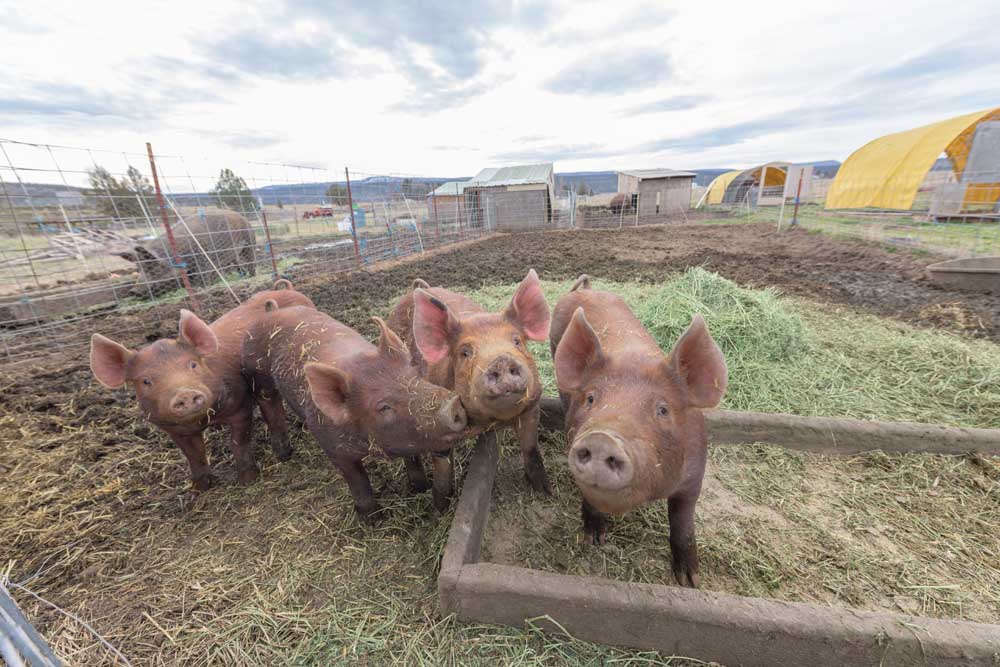An Accidental Farmer
Published 12:00 am Saturday, March 5, 2016

- An Accidental Farmer
Surrounded by rimrock and the foothills of the Ochocos, Jerre Kosta Dodson rotates her Irish Dexter cattle onto new pasture and watches for signs of their pleasure.
“They’re sometimes silly and run around the pasture kicking their heels up doing a jig of sorts,” said Dodson. “It’s very fun to watch such happiness.”
The antics of her heritage breed cattle prompted her to name her 10-acre farm, located five miles east of Prineville, the Dancing Cow Farm. In addition to running a cattle herd of 16 head including her own bull, Dodson also raises Jacob sheep, Tamworth hogs, Icelandic horses, Guinea fowl, chickens, a swarm of bees and a peacock. Named “BB” for Beautiful Boy, the peacock arrived at the farm as an egg on a hot water bottle, a gift from friends. Unique animals aren’t the only items of interest at Dancing Cow Farm.
“Last year I planted an apple orchard and this year I’ll be planting strawberries,” said Dodson. “If I can, I’ll be planting more fruit trees, try nuts and expand the berry project. I like to experiment.”
The farm has a full and diverse vegetable, flower, herb and fruit garden including at least 150 heritage varieties. Dodson is committed to helping preserve heritage animals and plants, and her entire farm has been focused on that effort.
“Heritage breeds are old breeds that have been pushed aside for other often larger-sized and more commercial breeding needs. By doing this a lot was lost,” said Dodson. “The small farm producer growing food for the local community for one. Taste and health fell by the side — health in the animal and health in the consumer.”
Heritage animals and seed are strong and have the genetics for survival. Dodson said that she doesn’t have the birthing and health problems with her heritage breeds that she hears about from other farmers. There are other advantages too, including a generally smaller size that is perfect for small farming.
“Often a heritage animal was bred to do more than one job,” said Dodson. “My Dexters were bred for milk, meat and draft. From my sheep I harvest meat, horn, wool and I could get milk if I wanted. My hogs know how to birth and raise a piglet without my help. My plants are healthy and strong even through dry times. I save seed from year to year with my heritage plants. We need to save and protect these genetics for our own survival. They’ll save us, if we save them. “
After an “accidental” entry into farming 13 years ago — it was either that or pay 10 years of farm deferral back taxes on the property she had just purchased — Dodson embraced the opportunity to revisit one of her dreams. Back in the 1970s she had actually planned to become a farmer, but life changes shifted her career toward archaeology.
“After 20 years of being a transient archaeologist and taking things out of the ground I was given the choice to stay in one place and put things into the ground,” said Dodson. “Plus, there were family members with cancer issues and a growing granddaughter to consider. I felt that my family and my community needed a better food source to be healthy. I felt I could farm and make a difference in this world.”
The tagline of the Dancing Cow Farm is “A small farm in tune with nature, growing with the community.” Dodson said that the phrase came from her heart, and that it reflects where she sees herself and her farm in connection with the Central Oregon region.
“When I arrived organic was barely spoken. I was thought odd and foolish to farm the way I do,” said Dodson. “Since then, I’ve made a lot of friends.”
She has mentored other farmers, taught classes for OSU, given countless tours of the farm, fed hundreds of families, sold livestock to new and old farmers, worked in harmony with her neighbors, participated in fundraisers and continues to serve on many committees working to improve conditions for the farming community. Last year she hosted 40 middle school students from Portland for four days, helping to spread the word about the importance of Central Oregon farming and sustainable techniques.
“I love learning how best to meet the challenges of farming in this region, raising amazing livestock on pasture, the satisfaction of knowing I’m feeding my family and community the best possible food and educating and sharing all I know,” said Dodson. “I love seeing what I believe in and love about the farm reflected in the faces of people when they visit.”
Dancing Cow Farm products can be purchased directly from the farm or found at local farmers markets and at Central Oregon Locavore in Bend. Crooked River Open Pasture (CROP) events throughout the summer feature Dancing Cow Farm products, as does the café at the local hospital, St. Charles Prineville, and other local restaurants including the Ochoco Brewing Company.
Interested in getting involved? On Saturday, March 12 a volunteer event will be held at the farm organized by Willing Workers on Local Farms (WWOLF). The group will help Dodson prepare for the production season, planting seeds and other tasks, plus touring the farm and sharing lunch. To participate, contact Owen Murphy at 541-383-7766.
The first official Dancing Cow Farm event of the season will be held on Mother’s Day weekend, May 7-8 from 10 a.m. to 3 p.m. This is the tenth year for the event, which was created to honor all mothers and will feature a pop-up farmers market, sheep-shearing display, farm tours, fiber artists, music, family activities and more. As a bonus draw, Dodson said that there is usually a litter of newborn baby piglets to admire.
For more information, visit the Dancing Cow Farm Facebook page, call 541-306-0226 or email farmjerre@gmail.com.








